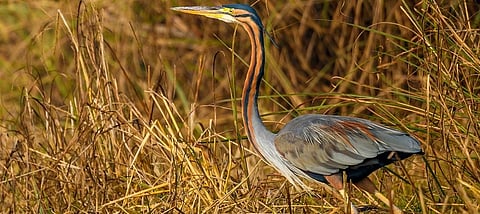

This can be a lesson to climate change deniers — if they still need one. Global warming forced 55 species of invertebrates, mammals and birds out of their natural range to parts of the United Kingdom or arrived in the country in the last 10 years. Worse, not even one group of the fauna showed resilience, claimed a study by the Zoological Society of London.
Take the case of black bee fly (Anthrax anthrax) — it arrived on the island nation in 2016; or the Jersey tiger moth (Euplagia quadripunctaria) — previously seen around Jersey and England's south coast, it is now sighted regularly in London.
Keen birdwatchers identified species such as purple heron (Ardea purpurea) and tropical-looking European bee-eater (Merops apiaster) nesting in Kent and Nottinghamshire. Their natural breeding grounds are in Africa, central and southern Europe and East Asia.
“Our results suggest that many species are on the move in the UK, and that we can expect a lot of changes in the type of nature we will have around us in the coming years,” Nathalie Pettorelli, lead author and senior Research Fellow at ZSL’s Institute of Zoology said.
Of the 55 species identified between 2008 and 2018, 10 were attributed to people posting images online of the animals in unusual places. The rest were identified from the UK Government environment reports as well as 111 scientific papers.
While 64 per cent were invertebrates, only one was formally classified as an invasive species — the leathery sea squirt (Styela clava). Of the new species arriving or displaced, 24 per cent were accounted for negative impacts like damage to crops, biofouling, human disease spread and increased pressure on planning permissions, the study found.
Due to lack of an integrated national platform to track species displaced by climate change, the team turned to Twitter and Google to search for rare species sightings. The study was published in the Journal of Applied Ecology.
ZSL scientists have now called people to submit their rare wildlife sightings on Twitter #SOTM_UK (species on the move), in order to assist further research.
Such migration has boosted tourism, for example in Scotland, after sightings of a Eurasian nuthatch (Sitta europaea) were reported in 2010 and 2018. The society, however, is currently “not ready for the redistribution of species, as current policies and agreements are not designed for these novel species and ecological communities — particularly if those species have no perceived value to society,” Pettorelli added.